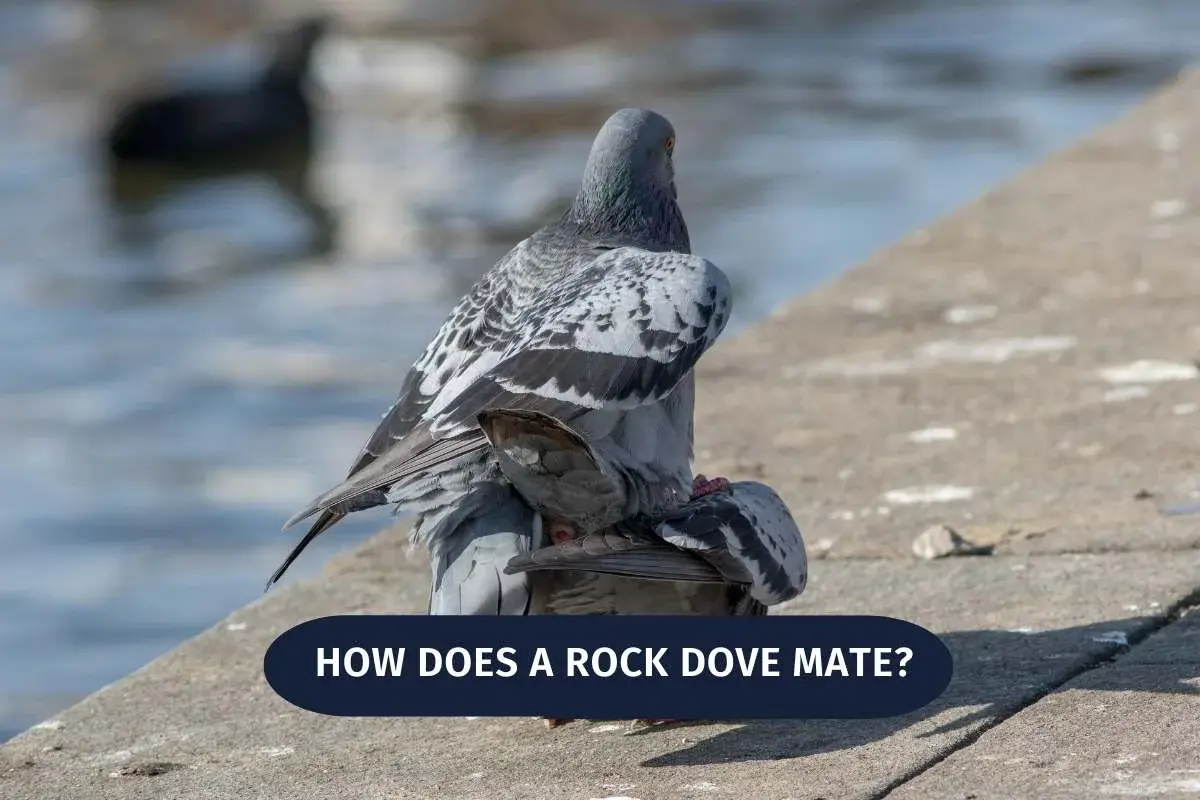If you are a bird enthusiast or have a pet rock dove, you probably wonder to know how does a rock dove mates. As a bird enthusiast I have done research on the following topic and here’s what I Know:
Rock doves, also known as feral pigeons, are monogamous birds that mate for life. When looking for a partner, rock dove perform elaborate courtship rituals which involve cooing, bowing and flying together in circles.
They lay eggs in existing nests or build sometimes built ones of their own. Female rock doves typically lay two broods per year. Both parents share the responsibility of incubating eggs and caring for the young. Both parents take frequent shifts to protect their nests from predators.
How do rock doves establish bonding with each other?
Rock doves usually establish their bond by preening each other’s feathers, and will remain faithful to the same mate throughout their lifetime.
Rock doves build nests together out of twigs, hey, and grasses, to lay and incubate two eggs at a time. Both parents take turns caring for their young until the chicks are old enough to fly away from the nest.
However, the pair may then go on to form another family or continue raising more young with each other in subsequent years.
What are the signs of rock dove or pigeon mating?
Following are the common sign of rock dove or pigeon mating:
- cooing and bowing
- flying around in circles
- preening each other’s feathers
- building a nest together
These signs start to strengthen the bond between the two birds and ensure successful reproduction. Of course, it’s also important that both birds are healthy and in good condition to ensure successful mating. However, if the birds are not healthy and in good condition, they will most likely not mate successfully.
What happens when a rock dove or pigeon loses its mate?
When a rock dove loses its mate, it will search for another mate to bond with. However, not all pairs are able to successfully form new bonds after losing their mates – some of them remain single throughout the year.
In such cases, the birds will still maintain social contact with other rock doves and may even form new relationships in the future.
Rock doves are fascinating creatures that have unique mating behaviours and social structures. Understanding how they mate and how they deal with losing their mates can help you in many ways if you are keeping rock doves or pigeons as pets.
How long are the rock doves pregnant for?
Rock doves are pregnant for around 8 to 12 days, during which they lay two eggs. The chicks hatch within 15 to 18 days during the natural incubation period. Both parents take turns incubating the eggs and caring for the young.
After hatching, the chicks remain in the nest for up to 4 weeks before they are able to fly away from their parents.
If you have pet rock doves, it is important to ensure a warm and safe place for them. Give your rock doves the chance to bond and reproduce in a healthy environment. Proper nutrition, housing, and mental stimulation are key for successful mating.
Rock Dove Mating Season
Rock doves mate in spring and summer, usually during the months of May to August. They typically form lifelong pair bonds with their mates and will remain loyal to them throughout the year.
During the breeding season, both males and females have a distinct “meeting call” which they use to find potential partners near their nesting site. Once a pair has bonded, they are likely to stick together for life unless one dies or leaves the area due to human disturbance.
Can a rock dove mate with a hawk?
No, a rock dove cannot mate with a hawk. Even though they are both birds, their genetic makeups are too different for them to produce viable offspring.
Additionally, the size difference between hawks and rock doves would likely prevent successful mating from occurring.
What happens if rock doves are disturbed during mating season?
If rock doves are disturbed while they’re mating, they may become separated and be unable to continue the process. This could mean that the eggs laid by the female will not develop or hatch, resulting in no offspring being produced.
It is important to keep this in mind when visiting areas where rock doves are known to nest and breed so as not to disturb their natural activities. However, if they are disturbed, they may try to re-establish their relationship by returning to the same nesting area and attempting to mate again.
What happens when a rock dove mate dies?
If a rock dove’s mate dies, the surviving bird will often seek out another partner. This may take some time as the surviving dove has to go through the mating ritual again with a new potential mate.
However, if the surviving dove is unable to find someone else, it may opt for living alone for the remainder of its life. In that case, it won’t be able to reproduce and there will be no offspring produced.
Did I answer everything you need to know about how does a rock dove mate?
How a rock dove mates and how it deals with losing its mate are interesting facts to observe. While rock doves usually form lifelong pair bonds, they may still find new partners if their mates die.
It is important to understand how these birds mate and how they cope with disturbance during the mating period in order to ensure successful breeding of rock doves in captivity.
Additionally, understanding how a rock dove reacts when its mate dies can also help us better appreciate how resilient these creatures can be in the face of adversity. In any case, it is clear that how a rock dove mates and how it deals with the death of its mate are fascinating behaviours worth studying. Know more about rock dove from my recent publish article.

